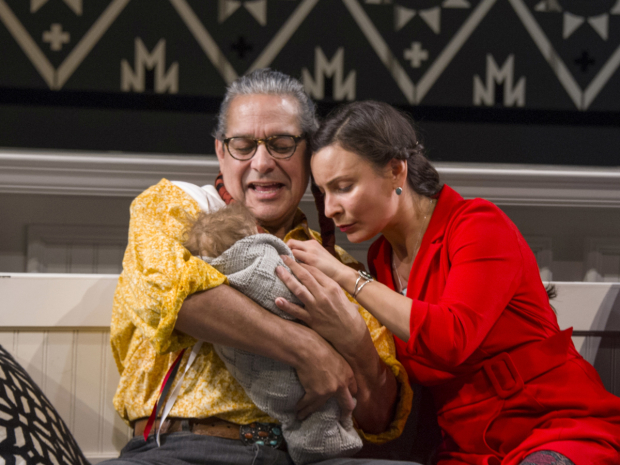
(© C. Stanley Photography)
Mary Kathryn Nagle's Sovereignty, which has just received its world premiere at Arena Stage, weaves smoothly between America's present and its past circa 1830. The 19th-century portions, which make up approximately half of the play, center around Cherokee Nation citizen John Ridge, who was Nagle's great-great-great-grandfather.
Ridge attended a boarding school in Connecticut, fell in love with the schoolmaster's daughter, Flora, and married her. The play thereafter finds him working at the center of a schism between two families of the Cherokee Nation — the Ridge family and the Ross family — as they disagree about how to deal with the true enemy of the Cherokee people: President Andrew Jackson.
Although Native Americans had been helpful to Jackson in his war campaigns, when it came to owning land, Jackson preferred them out of the way. In 1832, Jackson refused to enforce the decision of his own Supreme Court chief justice, John Marshall, who upheld the inherent right of the Cherokee people to prosecute anyone who enters their land and commits crimes against their people. The immediate issue was the case of Samuel Worcester, who features in Sovereignty. Worcester was a missionary to the Cherokee, a printer, and the first to establish a Native American newspaper. He also worked to help advance the case for the Cherokee Tribal Council.
The contemporary scenes of the play tell the fictionalized story of Ridge's great-great-great-granddaughter, Sarah Polson, a lawyer arguing on behalf of her people, fighting for the same issue her forefathers had fought for in 1832: jurisdiction over people coming into Cherokee land and committing crimes, specifically rape.
Kalani Queypo is powerful as John Ridge. Queypo appears first as a young man, totally in love with a white woman, then reveals Ridge as sincere and enthusiastic in his private life, intelligent and well-spoken in his public life. Joseph Carlson plays Jackson with so much venom, it is easy to see how he became an enemy of Native Americans.
Kyla García plays Polson as smart and direct, and the opening of her case is a good conclusion to the play. Andrew Roa is excellent as Major Ridge. Michael Glenn plays Worcester very credibly, as a stalwart Christian refusing to complain about his fate.
The play is impeccably directed by Molly Smith, who makes easy work of the complicated switches between eras and personas (actors frequently double up on parts). However, the play is not as tightly written as it needs to be in order for the audience to clearly understand the historical and political elements of the production. Nagle attempts to overcome this obstacle by adding a lot of exposition to fill in some of the major points of the United States' relationship to the Cherokee Nation in 1832 versus now.
Ken MacDonald creates a clean Cherokee design-influenced set that also suggests a judicial court. Period and modern props appear that help to delineate between past and present. Costume designer Linda Cho capitalizes on the two different time periods, giving the predominantly male cast beautifully crafted swallow-tail coats and vests when they inhabit the 19th century and unremarkable clothes when they inhabit the 21st. Sarah Polson looks like a modern woman throughout in a red skirt, brown boots, and various jackets.
In keeping with the current cultural movement, Nagle highlights women's lives in the tribal nation, focusing on the result of a 1978 Supreme Court decision that Tribal Nations do not exercise the "criminal jurisdiction over non-Indians," something her ancestors fought so hard to establish. She sees rates of non-Indian violence against women growing drastically and feels that Native women are forced to face much higher than normal rates of sexual and domestic abuse. It's rare that theater has a direct effect on our laws, but who knows? If any play could get Congress to reauthorize the Violence Against Women Act in 2018, it could be Sovereignty.









